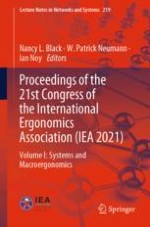2021 | OriginalPaper | Chapter
Helping a Robot to be “Autonomous”: The Expertise of a (Human) Roboticist in a Manufacturing Plant
Authors : Natalia Radicchi, Luciana Detoie, Rodrigo Ribeiro, Francisco Lima
Published in: Proceedings of the 21st Congress of the International Ergonomics Association (IEA 2021)
Publisher: Springer International Publishing
Activate our intelligent search to find suitable subject content or patents.
Select sections of text to find matching patents with Artificial Intelligence. powered by
Select sections of text to find additional relevant content using AI-assisted search. powered by
